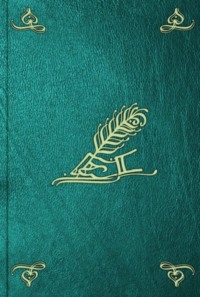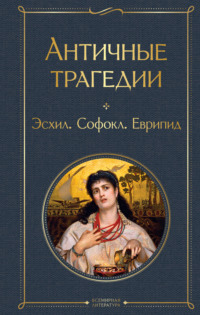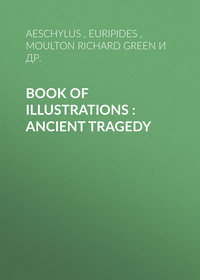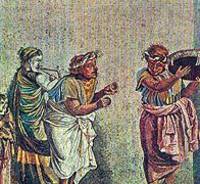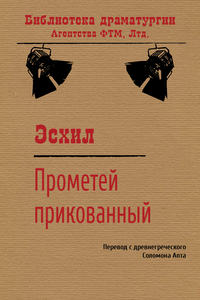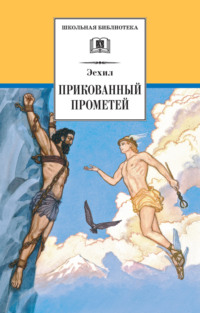 полная версия
полная версияÆschylos Tragedies and Fragments
322
Zephyros, Boreas, and the other great winds were represented in the Theogony of Hesiod (v. 134) as the offspring of Astræos and Eôs, and Astræos was a Titan. The west wind was, of course, favourable to Paris as he went with Helen from Greece to Troïa.
323
Here again the translator has to meet the difficulty of a pun. As an alternative we might take —
“To Ilion brought, well-named,
A marriage marring all.”
324
The sons of Priam are thought of as taking part in the celebration of Helen's marriage with Paris, and as, therefore, involving themselves in the guilt and the penalty of his crime.
325
Here, too, it may be well to give an alternative rendering —
“A mischief in his house,
A man reared, not on milk.”
Home-reared lions seem to have been common as pets, both among Greeks and Latins (Arist., Hist. Anim. ix. 31; Plutarch, de Cohib. irâ, § 14, p. 822), sometimes, as in Martial's Epigram, ii. 25, with fatal consequences. The text shows the practice to have been common enough in the time of Pericles to supply a similitude.
326
There may, possibly, be a half allusion here to the passage in the Iliad (vv. 154-160), which describes the fascination which the beauty of Helen exercised on the Troïan elders.
327
The poet becomes a prophet, and asserts what it has been given him to know of the righteous government of God. The dominant creed of Greece at the time was, that the Gods were envious of man's prosperity, that this alone, apart from moral evil, was enough to draw down their wrath, and bring a curse upon the prosperous house. So, e. g., Amasis tells Polycrates (Herod. iii. 40) that the unseen Divinity that rules the world is envious, that power and glory are inevitably the precursors of destruction. Comp. also the speech of Artabanos (Herod. vii. 10, 46). Against this, in the tone of one who speaks singlehanded for the truth, Æschylos, through the Chorus, enters his protest.
328
Sc., Agamemnon, by the sacrifice of Iphigeneia, had induced his troops to persevere in an expedition from which, in their inmost hearts, they shrank back with strong dislike. A conjectural reading gives,
“By the sacrifice he offered
Giving death-doomed men false boldness.”
329
The tone of ambiguous irony mingles, it will be seen, even here, with the praises of the Chorus.
330
Possibly an allusion to Pandora's box. Here, too, Hope alone was left, but it only came up to where the curve of the rim began, not to its top. The imagery is drawn from the older method of voting, in which (as in Eumenides, v. 678) the votes for condemnation and acquittal were cast into separate urns.
331
The lion, as the symbol of the house of Atreus, still seen in the sculptures of Mykenæ; the horse, in allusion to the stratagem by which Troïa had been taken.
332
At the end of autumn, and therefore at a season when a storm like that described by the herald would be a probable incident enough.
333
So in Sophocles, Philoctetes (v. 1025) taunts Odysseus: —
“And yet thou sailedst with them by constraint,
By tricks fast bound.”
334
Geryon appears in the myth of Hercules as a monster with three heads and three bodies, ruling over the island Erytheia, in the far West, beyond Hesperia. To destroy him and seize his cattle was one of the “twelve labours,” with which Hesiod (Theogon. vv. 287-294) had already made men familiar.
335
When a man is buried, there is earth above and earth below him. Clytæmnestra having used the words “coverlet,” pauses to make her language accurate to the very letter. She is speaking only of the earth which would have been laid over her husband's corpse, had he died as often as he was reported to have done. She will not utter anything so ominous as an allusion to the depths below him stretching down to Hades.
336
Or —
“Weeping because the torches in thy house
No more were lighted as they were of yore.”
337
The words touch upon the psychological fact that in dreams, as in other abnormal states of the mind, the usual measures of time disappear, and we seem to pass through the experiences of many years in the slumber of a few minutes.
338
The rhetoric of the passage, with all its multiplied similitudes, fine as it is in itself, receives its dramatic significance by being put into the lips of Clytæmnestra. She “doth protest too much.” A true wife would have been content with fewer words.
339
The last three lines of the speech are of course intentionally ambiguous, carrying one meaning to the ear of Agamemnon, and another to that of the audience.
340
There is obviously a side-thrust, such as an Athenian audience would catch at, at the token of homage which the Persian kings required of their subjects, the prostration at their feet, the earth spread over with costly robes. Of the latter custom we have examples in the history of Jehu (2 Kings ix. 13), in our Lord's entry into Jerusalem (Mark xi. 8), in the usages of modern Persian kings (Malcolm's Persia, i. 580); perhaps also in the true rendering of Ps. xlv. 14. “She shall be brought unto the king on raiment of needle-work.” In the march of Xerxes across the Hellespont myrtle-boughs strown on the bridge of boats took the place of robes (Herod. vii. 54). To the Greek character, with its strong love of independence, such customs were hateful. The case of Pausanias, who offended the national feeling by assuming the outward state of the Persian kings, must have been recalled to the minds of the Athenians, intentionally or otherwise, by such a passage as this.e bridge of boats took the place of robes (Herod. vii. 54). To
341
The “old saying, famed of many men,” which we find in the Trachiniæ of Sophocles (v. 1), and in the counsel of Solon to Crœsos (Herod. i. 32).
342
He who had suffered so much from the wrath of Artemis at Aulis knew what it was to rouse the wrath and jealousy of the Gods.
343
An echo of a line in Hesiod (Works and Days, 763) —
“No whispered rumours which the many spread
Can ever wholly perish.”
344
Here, too, we may trace a reference to the Oriental custom of recognising the sanctity of a consecrated place by taking the shoes from off the feet, as in Exod. iii. 5, in the services of the Tabernacle and Temple, through all their history (Juven., Sat. vi. 159), in all mosques to the present day. Agamemnon, yielding to the temptress, seeks to make a compromise with his conscience. He will walk upon the tapestry, but will treat it as if it, of right, belonged to the Gods, and were a consecrated thing. It is probably in connection with this incident that Æschylos was said to have been the first to bring actors on the stage in these boots or buskins (Suidas. s. v. άρβύλη).
345
The words of Isaiah (xviii. 5), “when the sour grape is ripening in the flower,” present an almost verbal parallel.
346
The ever-recurring ambiguity of Clytæmnestra's language is again traceable, as is also her fondness for rhetorical similitudes.
347
The Chorus speaks in perplexity. In cannot get rid of its forebodings, and yet it would seem as if the time for the fulfilment of the dark words of Calchas must have passed long since. It actually sees the safe return of the leader of the host, yet still its fears haunt it.
348
Asclepios, whom Zeus smote with his thunderbolt for having restored Hippolytos to life.
349
The Chorus, in spite of their suspicions and forebodings, have given the king no warning. They excuse themselves by the plea of necessity, the sovereign decree of Zeus overruling all man's attempts to withstand it.
350
Cassandra is summoned to an act of worship. The household is gathered, the altar to Zeus Ktesios (the God of the family property, slaves included), standing in the servants' hall, is ready. The new slave must come in and take her place with the others.
351
As in the story which forms the groundwork of the Trachiniæ of Sophocles, vv. 250-280, that Heracles had been sold to Omphale as a slave, in penalty for the murder of Iphitos.
352
Political as well as dramatic. The Eupatrid poet appeals to public opinion against the nouveaux riches, the tanners and lamp-makers, who were already beginning to push themselves forward towards prominence and power. The way was thus prepared in the first play of the Trilogy for what is known to have been the main object of the last. Comp. Arist., Rhet. ii. 32.
353
Here again the translator has the task of finding an English paronomasia which approximates to that of the Greek, between Apollo and ἀπόλλων the destroyer. To Apollo, as the God of paths (Aguieus), an altar stood, column-fashion, before the street-door of every house, and to such an altar, placed by the door of Agamemnon's palace, Cassandra turns, with the twofold play upon the name.
354
This refers, probably, to the death of Hippodameia, the wife of Pelops, who killed herself, in remorse for the death of Chrysippos, or fear of her husband's anger. The horrors of the royal house of Argos pass, one by one, before the vision of the prophetess, and this leads the procession, followed by the spectres of the murdered children of Thyestes.
355
The Chorus, as in their last ode, had made up their minds, though foreboding ill, to let destiny take its course. They do not wish that policy of non-interference to be changed by any too clear vision of the future.
356
The Chorus understands the vision of the clairvoyante as regards the past tragedy of the house of Atreus, but not that which seems to portend another actually imminent.
357
Fresh visions come before the eyes of the seeress. She beholds the company of Erinnyes hovering over the accursed house, and calls on them to continue their work till the new crime has met with its due punishment. The murder which she sees as if already wrought, demands death by stoning.
358
The “yellow” look of fear is thought of as being caused by an actual change in the colour of the blood as it flows through the veins to the heart.
359
Here there is prevision as well as clairvoyance. The deed is not yet done. The sacrifice and the feast are still going on, yet she sees the crime in all its circumstances.
360
As before (v. 115) the black eagle had been the symbol of the warrior-chief, so here the black-horned bull, that being one of the notes of the best breed of cattle. A various reading gives “with her swarthy horn.”
361
What the Chorus had just said as to the fruitlessness of prophetic insight tallied all too well with her own bitter experience.
362
The ecstasy of horror interrupts the tenor of her speech, and the second “thou” is addressed not to the Chorus, but to Agamemnon, whose death Cassandra has just witnessed in her vision.
363
The song of the nightingale, represented by these sounds, was connected with a long legend, specially Attic in its origin. Philomela, daughter of Pandion, king of Attica, suffered outrage at the hands of Tereus, who was married to her sister Procne, and was then changed into a nightingale, destined ever to lament over the fate of Itys her sister's son. The earliest form of the story appears in the Odyssey (xix. 518). Comp. Sophocles, Electr. v. 148.
364
In the marriage-rites of the Greeks of the time of Æschylos, the bride for three days after the wedding wore her veil; then, as now no longer shrinking from her matron life, she laid it aside and looked on her husband with unveiled face.
365
The picture might be drawn by any artist of power, but we may, perhaps, trace a reproduction of one of the grandest passages in the Iliad (iv. 422-426).
366
So in the Eumenides (v. 293), the Erinnyes appear as vampires, drinking the blood of their victims.
367
The death of Myrtilos as the first crime in the long history of the house of Pelops. Comp. Soth. Electr. v. 470. The “defiler” is Thyestes, who seduced Aerope, the wife of Atreus.
368
The horror of the Thyestes banquet again haunts her as the source of all the evils that followed, of the deaths both of Iphigenia and Agamemnon. The “stay-at-home” is Ægisthos.
369
Both words point to the Sindbad-like stories of distant marvels brought back by Greek sailors. The Amphisbæna (double-goer), wriggling itself backward and forward, believed to have a head at each extremity, was looked upon as at once the most subtle and the most venomous of serpents. Skylla, already famous in its mythical form from the story in the Odyssey (xii. 85-100), was probably a “development” of the monstrous cuttle-fish of the straits of Messina.
370
As in Homer (Il. i. 14) so here, the servant of Apollo bears the wand of augury, and fillets or wreaths round head and arms. The divining garments, in like manner, were of white linen.
371
If we adopt this reading, we must think of Cassandra as identifying herself with the woe (Atè) which makes up her life, just as afterwards Clytæmnestra speaks of herself as one with the avenging Demon (Alastor) of the house of Atreus (1473). The alternative reading gives —
“Make rich in woe another in my place.”
372
Perhaps, “in home not mine.”
373
When the victim, instead of shrinking and struggling, went, as with good courage, to the altar, it was noted as a sign of divine impulse. Such a strange, new courage the Chorus notices in Cassandra.
374
Possibly,
“My one escape, my friends, is but delay.”
375
The implied thoughts of the words is that Priam and his sons, though they had died nobly, were yet miserable, and not happy.
376
The Syrian ritual had, it would seem, become proverbial for its lavish use of frankincense and other spices.
377
The close parallel of Shakespeare's Henry VI., Act. v. sc. 6, is worth quoting —
“The bird that hath been limed in a bush,
With trembling eyes misdoubteth every bush”
378
The older reading gives —
“A shadow might o'erturn it.”
379
Her own doom, hard as it was, touches her less than the common lot of human suffering and mutability.
380
So far the dialogue has been sustained by the Coryphæos, or leader of the Chorus. Now each member of it speaks and gives his counsel.
381
The Coryphæos again takes up his part, sums up, and pronounces his decision.
382
i. e., He had had his triumph over her when, forgetful of her mother's feelings, he had sacrificed Iphigeneia. She has now repaid him to the full.
383
The third libation at all feasts was to Zeus, as the Preserver or Guardian Deity. Clytæmnestra boasts that her third blow was as an offering to a God of other kind, to Him who had in his keeping not the living, but the dead.
384
So in the Choëphori (vv. 351, 476), the custom of pouring libations on the burial-place of the dead is recognised as an element of their blessedness or shame in Hades, and Agamemnon is represented as lacking the honour which comes from them till he receives it at the hand of Orestes.
385
Incense was placed on the head of the victim. The Chorus tell Clytæmnestra that she has brought upon her own head the incense, not of praise and admiration, but of hatred and wrath, as though some poison had driven her mad.
386
The species of swan referred to is said to be the Cygnus Musicus. Aristotle (Hist. Anim. ix. 12) describes swans of some kind as having been heard by sailors near the coast of Libya, “singing with a lamentable cry.” Mrs. Somerville (Phys. Geog., c. xxxiii. 3) describes their note as “like that of a violin.” The same fact is reported of the swans of Iceland and other regions of the far North. The strange, tender beauty of the passage in the Phædo of Plato (p. 85, a), which speaks of them as singing when at the point of death, has done more than anything else to make the illustration one of the commonplaces of rhetoric and poetry.
387
The structure of the lyrical dialogue that follows is rather complicated, and different editors have adopted different arrangements. I have followed Paley's.
388
Several lines seem to have dropped out by some accident of transcription.
389
Agamemnon and Menelaos, as descended from Tantalos, the father of Pelops.
390
In each case women, Helen and Clytæmnestra, had been the unconscious instruments of the divine Nemesis, to which the Chorus traces the ruin of the house of Atreus.
391
Or, with another reading, —
“He (sc. the avenging Demon) boasteth in his pride of heart.”
392
It is characteristic of the teaching of Æschylos that the Chorus passes from the thought of the agency of any lower Power to the supreme will of Zeus.
393
Or, “Dying, as dies a slave.”
394
Clytæmnestra still harps (though in ambiguous words, which may refer also to the murder of the children of Thyestes) upon the death of Iphigeneia as the crime which it had been her work to avenge.
395
Perhaps, “And that, too, not a slave's.”
396
Here the genealogy is carried one step further to Pleisthenes, the father of Tantalos.
397
Ægisthos, in his version of the story, suppresses the adultery of Thyestes with the wife of Atreus, which led the latter to his horrible revenge.
398
The image is taken from the trireme with its three benches full of rowers. The Chorus is compared to the men on the lowest, Ægisthos and Clytæmnestra to those on the uppermost bench.
399
The earliest occurrence of the proverb with which we are familiar through the history of St. Paul's conversion, Acts ix. 5, xxvi. 14.
400
The trace-horse, as not under the pressure of the collar, was taken as the type of free, those that wore the yoke, of enforced submission.
401
Hermes is invoked, (1) as the watcher over the souls of the dead in Hades, and therefore the natural patron of the murdered Agamemnon; (2) as exercising an authority delegated by Zeus, and therefore capable of being, like Zeus himself, the deliverer and helper of suppliants. So Electra, further on, invokes Hermes in the same character. The line may, however, be rendered,
“Who stand'st as guardian of my father's house.”
The three opening lines are noticeable, as having been chosen by Aristophanes as the special object for his satirical criticism (Frogs, 1126-1176), abounding in a good score of ambiguities and tautologies.
402
The words point to the two symbolic aspects of one and the same practice. In both there are some points of analogy with the earlier and later forms of the Nazarite vow among the Jews. (1) As being part of the body, and yet separable from it without mutilation, it became the representative of the whole man, and as such was the sign of a votive dedication. As early as Homer, it was the custom of youths to keep one long, flowing lock as consecrated, and when they reached manhood, they cut it off, and offered it to the river-god of their country, throwing it into the stream, as that to which, directly and indirectly, they owed their nurture. Here the offering is made to Inachos, as the hero-founder of Argos, identified with the river that bore his name. (2) They shaved their head, wholly or in part, as a token as a token of grief, and then, because true grief for the dead was an acceptable and propitiatory offering, this became the natural offering for suppliants who offered their prayers at the tombs of the departed. So in the Aias of Sophocles (v. 1174) Teucros calls on Eurysakes to approach the corpse of his father, holding in his hand locks of his own hair, his mother's, and that of Teucros. In the offering which Achilles makes over the grave of Patroclos of the hair which he had cherished for the river-god of his fatherland, Spercheios, we have the union of the two customs. Homer. Il. xxiii. 141-151.
403
After the widespread fashion of the East, the handmaids of Clytæmnestra (originally Troïan captives) had to rend their clothes, beat their breasts, and lacerate their faces till the blood came. The higher civilisation of Solon's laws had forbidden these wild, barbarous forms of grief at Athens. Plutarch, Solon, p. 164.
404
Purposely, perhaps, obscure. They seem to say that the old reverence for Agamemnon has passed away, and instead of it there is only a slavish fear for Ægisthos. For the more acute, however, they imply that those who have cause to fear are Ægisthos and Clytæmnestra themselves.
405
The words, in their generalising sententiousness, refer specially to the twofold crime of Ægisthos as an adulterer and murderer. Then, in the Epode, the Chorus justify themselves for their seeming inconsistency in thus abhorring the guilt, and yet acting as instruments of the guilty in their attempts to escape punishment.
406
The mourners speak, of course, of Agamemnon and Orestes, not of Ægisthos and Clytæmnestra.
407
A mixture of meal, honey, and oil formed the half-liquid substance commonly used for these funereal libations. The “garlands” may be wreaths of flowers or fillets, or the word may be used figuratively for the libation itself, as crowning the mound in which Agamemnon lay.
408
The words point to a strange Athenian custom. When a house was cleansed of that which defiled it, morally or physically, the filth was carried in an earthen vessel to a place where three ways met, and the worshipper flung the vessel behind him, and walked away without turning to look at it. To Electra's mind, the libation which her mother sends is equally unclean, and should be treated in the same way. So in Hom. Il. i. 314, the Argives purify themselves, and then cast the lustral water they have used into the sea. Lev. vi. 11, gives us an analogous usage. Comp. also Theocritos, Idyll xxiv., vv. 22-97.


